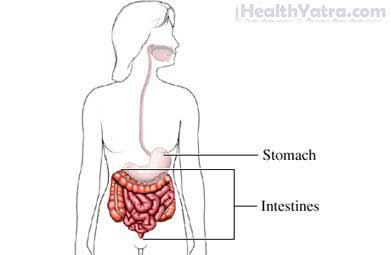Definition
In intestinal pseudo-obstruction, foods and liquids are unable to pass through the intestine, causing a build-up of food, fluid, and gas in all or part of the colon. The symptoms of this condition acts like a mechanical bowel obstruction, but no blockage is found when doctors examine the intestine.

Causes
Intestinal pseudo-obstruction is caused by problems with the muscles and nerves of the intestine.
Risk Factors
A risk factor is something that increases your chance of getting a disease or condition. The following factors are thought to increase the risk of developing intestinal pseudo-obstruction:
- Surgery
- Abdominal hemorrhage
- Intestinal ischemia (insufficient blood supply to the digestive system)
- Inflammation (eg, infection)
- Trauma
- Stroke
- Metabolic problems
- Fluid overload (eg, congestive heart failure)
- Other medical illnesses associated with pain
- Some medications
Symptoms
Symptoms of intestinal pseudo-obstruction may include:
- Cramps
- Stomach pain
- Nausea
- Vomiting
- Bloating
- Reduction in bowel movements
- Loose stools
- Bladder problems
Diagnosis
Your doctor will ask about your symptoms and medical history, and perform a physical exam. Other tests may include:
- Abdominal X-rays —a test that uses radiation to take a picture of structures inside the body
- Abdominal CT scan —a type of x-ray that uses a computer to make pictures of structures inside the body
- Blood tests
- Urine tests
Treatment
Talk with your doctor about the best treatment plan for you. Treatment options include:
Nutritional Support
Intravenous (IV) feeding may be necessary to help prevent malnutrition.
Medications
Your doctor may prescribe antibiotics to help prevent bacterial infections due to your condition. In addition, medications can be used to treat muscle problems in the intestines. Changes in your medications to eliminate some medications that can slow recovery from, or worsen, this condition.
Surgery
In severe cases of intestinal pseudo-obstruction, surgery to remove part or your entire intestine may be necessary.
Endoscopy
If the colon does not resume normal function after conservative management, the pressure build-up in the colon can be relieved by removing the trapped air with acolonoscope.
Prevention
Many cases of intestinal pseudo-obstruction cannot be prevented. But certain measures can be taken after surgery to help avoid the complication of intestinal pseudo-obstruction. These measures include:
- Early oral feeding
- Gum chewing
- Fluid restriction
- Medications that inhibit opioid receptors
- Beta-blockers
